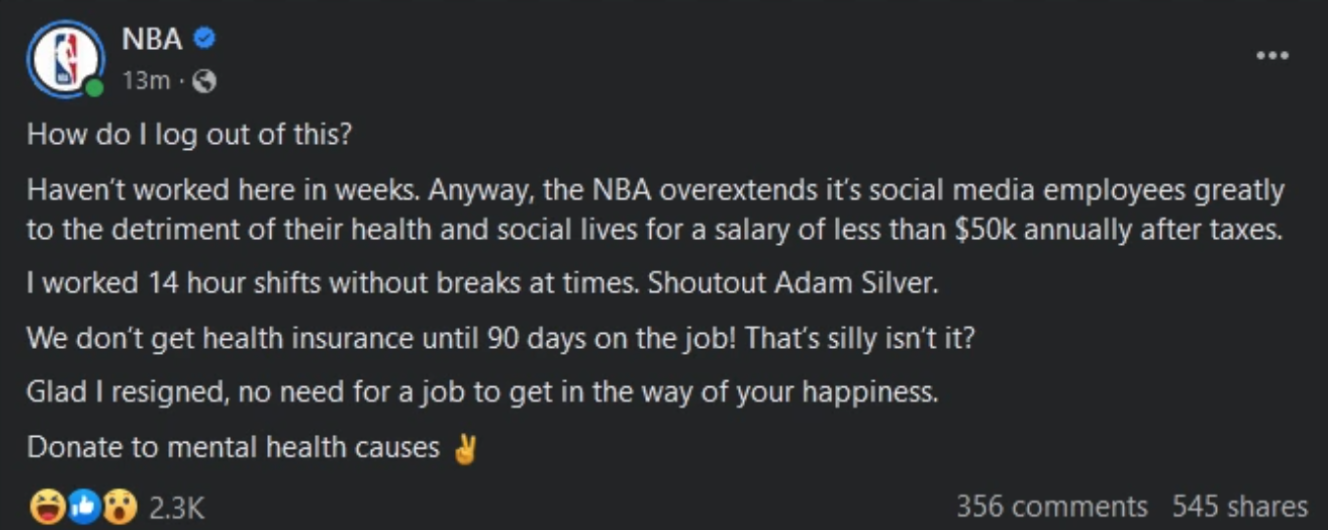11 Tips for Effective Social Media Management During a Crisis
/Crisis communication skills are becoming increasingly essential in many roles, whether you’re a business leader or a marketing and communications professional. In 2024, it’s critical that social media managers know how to navigate a crisis on social media when one inevitably begins to unfold. So what exactly constitutes a crisis and how do you do a good job handling one on social media? Today I’m sharing 11 of my best tips for social media managers to handle a crisis online.
So what is a crisis?
According to HubSpot, a crisis must: pose an imminent threat to the organization, be a surprise/shock, and put you under pressure to move quickly and make thoughtful decisions. Crises can threaten public safety, your organization’s credibility, and your organization’s financial viability. There are many different types of crisis, including natural ones like blizzards and hurricanes, personnel situations, workplace violence like a school shooting, a financial crisis like embezzlement, a technological crisis like a data breach, and more. Depending on your business, some of these crisis scenarios may be more likely than others. Either way, it’s best for everyone to be prepared–higher ups and social media professionals alike.
sometimes your brand may be roped into current events in unexpected ways! you wouldn’t think a crisis like the death of the queen would involve a children’s tv brand like bluey, but bluey was affected and expected to respond!
What constitutes a social media crisis crisis?
Hootsuite defines a social media crisis as “When your social media activity spurs a flurry of negative responses…a major change in the online conversation about your brand: an action that has sparked anger, disappointment, or distrust on a wide scale. If left unaddressed, it could have major long-term consequences for your brand.” In some small organizations, social media managers are flying solo and a crisis situation can be even more high stakes and stressful. Given the potential for long-term impact, it’s essential for social media managers to be prepared for a crisis and supported during and after one.
Without further ado, here are 11 tips for navigating a crisis on social media when it strikes.
1) Ensure Accounts are Secured
This one is for before a crisis unfolds, but it’s key. Minimize the number of people who have access to your organization’s social media accounts. It shouldn’t be every single person on the marketing team. Only a handful of folks truly need access to your brand’s social channels. Using strong passwords (or a password manager) can also help keep your brand’s accounts secure. Another best practice is enabling two factor authentication for everyone who has access to the accounts. Lastly, make sure that you promptly remove anyone who no longer works for your organization. Leaving former employees attached to your Facebook page is a recipe for disaster.
a former nba employee still had access to their facebook page and wreaked some havoc with an honest rant
2) Pause
Always pause and assess the situation before taking action. First, evaluate: is this a crisis or a problem? Problems are more like minor customer service issues that can be resolved following standard protocols. A crisis, on the other hand, affects a much larger audience, requires a special response, and can have serious long-term effects. If you’ve determined it’s a full-fledged crisis, the pause is still important. That leads me to our next step.
3) Evaluate Scheduled Content
Many social media managers proactively schedule content a week or two in advance. The problem in 2024? Crises arise frequently–whether it’s your brand’s own crisis or something concerning in current events. Take a moment to evaluate your scheduled posts. How will they be perceived in light of your brand’s crisis? It’s usually a good idea to move these back to draft mode or reschedule them instead of letting them go out as scheduled while the crisis is still unfolding.
4) Don’t Operate in a Silo
Whether your organization has a crisis response team or not, as a social media manager navigating a crisis, you shouldn’t operate in a silo. Make sure to communicate with key stakeholders internally, from decisionmakers who determine what actions the organization will take to marketing and communications directors who shape the strategy of how you’ll be communicating about the situation. Run your ideas by others, share feedback, and communicate consistently. Keeping everyone in the loop helps ensure that the organization’s response isn’t messy and disjointed.
5) Listen Closely
As a social media manager, listening to the online conversation is a big piece of the job. What are people saying online about your brand’s crisis? What are the predominant sentiments? Take in as much information as possible, summarize it succinctly, include representative quotes if possible, and report that back to either your boss or the crisis response team.
6) Acknowledge the Situation
While you may not have an immediate fix for the crisis, at the very least, your organization should quickly acknowledge that they are aware of the situation, looking into it, and working on a resolution. You can draft something called a ‘holding statement’ in conjunction with the PR team to let folks know that the situation is being monitored and a more detailed response is in the works. Sharing this on your social channels, tailored to each platform, is a good way to get the word out quickly.
7) Avoid Getting Defensive or Emotional
Doubling down, getting defensive, or reacting emotionally are never a good look for a brand. As the social media manager, you are the voice of the brand online, and it’s important not to let your own personal opinions shine through.
In July 2024, StickerMule sent out an email declaring their support for Donald Trump and encouraging folks to buy Trump t-shirts. They received a great deal of backlash and could have responded in a few different ways. StickerMule did not pause and review the situation, issue a holding statement, or assess their audience’s sentiments. Instead, they doubled down, with the CEO sticking by what he said and the marketing director commenting “idgaf” on LinkedIn posts analyzing the situation. Their Twitter account even publicly posted replies to the email without redacting customers’ names and email addresses. All of this made the situation worse and StickerMule lost tons of customers in a single day.
Online conversations about the defensive and unprofessional conduct of StickerMule employees as their own brand crisis unfolded.
8) Always be Empathetic
Empathy should be at the heart of your crisis response strategy, on social media and beyond. Keep those impacted at the forefront of your mind while developing any statements and considering what actions to take moving forward. A genuine response that shows you care is the most important thing. Ignoring the situation, getting defensive, or being performative are surefire ways for your response to miss the mark.
A bland, ineffective statement from the CEO of anheurser-busch, parent company of bud light, in which he does not show empathy for dylan mulvaney or the trans community that was affected by the online hate shown for trans people after mulvaney was gifted a bud light can with her face on it
9) Monitor the Comments
There’s a lot to be learned from your comments section, so monitor the conversation carefully. It’s a great way to get practical feedback that you can pass along to the larger crisis response team.
Make sure you have a policy in place for how to handle negative comments. Deleting them isn’t necessarily the best approach. Sometimes people just need a place to voice how they’re feeling, and if it’s not in your comments section, it will be somewhere else online. If it’s in your comments section, you can stay in the loop on what folks are saying and learn from it. Your policies should dictate what types of comments warrant deleting, though–typically harassment and hate speech are grounds for deletion.
Some brands try turning off the comments to shut down criticism and debate, but that approach can be problematic. Turning off the comments makes it seem like you’re in the wrong. Many social media users will notice that comments are turned off and assume the brand is guilty and in defense mode.Keep that in mind before deciding to turn the comments off.
10) Take Care of Your Mental Health
Social media management can have a big impact on your health, whether you’re navigating a crisis situation or just an average week at work. Many social media managers tie their own identities closely to the brand they work for, so criticism of the brand can feel hurtful and upsetting. It’s also common for social media managers to have very little power in the grand scheme of things–you may disagree with the way your employer is handling the crisis, but have little to no ability to change their response. Share feedback, advocate for what you can, and remember that at the end of the day, this is just a job. You’re doing your best, and that’s all you can do.
As the crisis unfolds, work with your manager to try to ensure the workload is distributed as evenly as possible. Managing the online crisis response is a heavy burden to bear, so sharing the work with others can be helpful. Take breaks when possible. As earth-shattering as a crisis situation can feel, it’s okay to log off. A crisis doesn’t resolve overnight. Fixing it isn’t all on you. You’re doing what you can and the crisis will be there in the morning.
11) Review What Worked & What Didn’t
Evaluating your crisis response is the final step of any crisis communication protocol. What went well? What didn’t? What would you change for the future? While crisis situations can be incredibly stressful, they are also great learning opportunities, so try to find a few key takeaways that you can incorporate into your social media management and crisis communication work in the future.
This blog post is based in part on the Crisis Communication and Social Media courses I teach as an Adjunct Professor at Nazareth University. For more social media and crisis management insights, subscribe to my unboring email newsletter.








